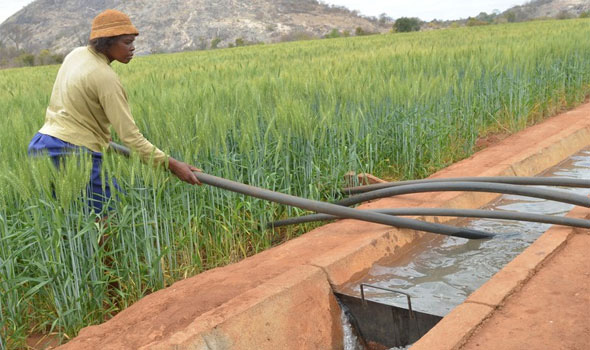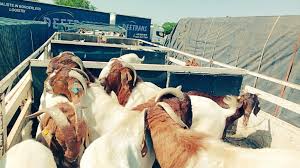Dealing with heartwater disease in goats and sheep
Farmer’s Diary
In response to numerous inquiries from farmers, this week’s instalment is dedicated to exploring one of the most common yet deadly tick-borne diseases affecting goats and sheep in the country: Heartwater.
Known locally in Shona as “Chizeezee”or “Chindeende” this disease poses a significant threat to livestock across the country. The name “Chizeezee” or “Chindeende” is an onomatopoeic term, describing the nervous symptoms exhibited by infected animals, such as trembling, shivering, staggering and convulsive behaviours.
Given heartwater’s rapid progression and high mortality rate, it is vital for farmers to recognise its symptoms early and understand the available prevention methods and treatment options to protect their livestock from this deadly disease.
Understanding Heartwater
Heartwater is caused by the bacterium Ehrlichia ruminantium, which is transmitted by Bont ticks. The disease primarily targets the nervous system, leading to severe symptoms like high fever, muscle tremors, convulsions, and fluid accumulation around the heart and lungs. The disease primarily affects goats, sheep, and cattle, but the severity of the disease is more pronounced in small ruminants, such as goats and sheep. Heartwater is most prevalent in regions where Bont ticks are found, typically in hot, dry bush areas.
Farmers in Zimbabwe, particularly those in warmer, low-lying regions, need to be vigilant, as these ticks thrive in such environments. The bacterium Ehrlichia ruminantium infects the endothelial cells lining the blood vessels, causing fluid to leak into body cavities, including the heart sac, lungs, chest cavity, and abdominal cavity.
This fluid accumulation is a hallmark of the disease, giving it the name “heartwater”.Infected animals can succumb to the disease within 24 hours, although some may survive for 2 to 5 days, depending on their overall health and immune response.
Heartwater Symptoms
Recognising the early signs of heartwater is vital for prompt intervention and treatment. The disease manifests through a range of clinical signs, which are often neurological:
(i) High Fever: A sudden and sharp increase in body temperature is one of the earliest signs of heartwater. Farmers should regularly monitor the temperature of their animals, especially during periods of high tick activity.
(ii) Neurological Symptoms: The affected goats or sheep may display a high-stepping, jerky gait, shivering, or walking in circles. These signs indicate that the central nervous system is affected.
(iii) Muscle Tremors and Convulsions: As the disease progresses, animals may exhibit jerky, paddling movements with their legs while lying down. They may also pull their head backward, a sign of severe nervous system involvement.
(iv) Fluid Accumulation: After death, a post-mortem examination will typically reveal excessive fluid in the heart sac, lungs, chest cavity, and abdominal cavity. This symptom confirms heartwater infection.
Heartwater Prevention
Preventing heartwater is challenging but not insurmountable. The key is to manage tick populations effectively and boost the animal’s natural immunity.
(i) Tick Control and Management
Since Bont ticks are the primary vectors for heartwater, controlling their population is crucial.
Farmers are advised to strike a balance between maintaining a low level of tick exposure to build resistance and preventing tick infestations.
Allowing a small number of ticks to remain on the animals can help maintain immunity. However, if there are visibly many ticks, dipping or spraying the animals with acaricides weekly is necessary.
(ii) Strategic Dipping Practices
Dipping goats and sheep at appropriate intervals is essential. Over-dipping can lead to resistance in tick populations while under-dipping increases the risk of disease. Regular dipping weekly during peak tick seasons helps keep tick numbers manageable without completely eliminating them, which is necessary to maintain some level of immunity.
(iii) Understanding Tick Habitats
Farmers should be aware of the areas where Bont ticks thrive, such as hot, dry bush regions. Grazing management strategies that avoid such areas during peak tick seasons can reduce the risk of heartwater outbreaks. Implementing rotational grazing and avoiding overgrazed or bushy areas can help minimise tick exposure.
(iv) Vaccination
Although vaccination against heartwater is available, it is complicated and often expensive.
It requires careful management and coordination with a veterinarian to be effective. Vaccination may be more suitable for larger herds where the cost can be justified. However, it is important to note that vaccination alone does not guarantee full immunity and should be combined with other preventive measures.
(v) Preventing Spread Through Infected Animals
If an animal dies from heartwater, it is crucial to dip the carcass to kill any ticks that might carry the disease. These ticks can infect other animals if they bite them. Proper disposal of carcasses and maintaining farm hygiene can prevent the spread of the disease.
(vi) Blocking Technique
A preventive approach called “blocking” involves treating young goats with a long-acting antibiotic before exposing them to tick-infested areas. This technique helps prevent heartwater outbreaks by providing temporary protection while the animals build natural immunity.
Treatment of Heartwater
Early detection and treatment are essential for effectively managing heartwater. Once neurological symptoms become apparent, the chances of recovery decrease significantly.
The primary treatment for heartwater involves the use of antibiotics. Short-acting tetracycline drugs are commonly used. It is crucial to begin treatment immediately, preferably before nervous symptoms develop.
For adult goats, a dosage of 5 ml of the antibiotic should be administered daily for three days, either intravenously (if possible) or intramuscularly.
For kids, the recommended dosage is 2.5 ml daily for three days. Dosages may vary depending on the specific formulation of the antibiotic purchased, so farmers should follow the instructions provided or consult their veterinarian.Intravenous injection is more effective but also more challenging to administer.
When intravenous administration is not feasible, an intramuscular injection can be used. Proper training and guidance from a veterinarian are recommended for farmers who need to administer these injections.
In cases where a rapid outbreak is anticipated, or during peak tick seasons, some farmers use long-acting antibiotics as a preventive measure. This strategy provides temporary protection for the animals while long-term preventive measures are implemented.
Practical Tips for Farmers
Regular monitoring is vital for managing heartwater. Farmers should routinely inspect their goats and sheep for signs of tick infestation and early symptoms of the disease. Using a thermometer to regularly check the body temperature of animals exhibiting signs of sickness is key in ensuring detection of heartwater in its early stages.
Community involvement and education are crucial for managing heartwater effectively, especially in areas where pastures are shared. Raising awareness within the community can encourage farmers to collaborate on preventative measures and learn from each other’s experiences to adopt best practices.
Farmers should also regularly consult their local agricultural extension officers and veterinarians to receive valuable support and information for managing heartwater.
Consulting with veterinarians regularly is crucial, especially when considering vaccination, treatment, or blocking strategies. Veterinarians offer expert guidance on best practices and recommend appropriate medications and dosages tailored to the specific needs of each herd.
Prompt intervention is essential in managing heartwater. Since the disease progresses rapidly, delaying treatment can lead to high mortality rates in the herd. Farmers should take immediate action to treat their animals at the first signs of early symptoms and seek veterinary assistance when necessary.
Conclusion
Heartwater remains a significant challenge for goat and sheep farmers in Zimbabwe. However, with proper management practices — including strategic tick control, early detection, timely treatment, and community education — the impact of this disease can be reduced. Farmers should adopt a proactive approach, combining effective management with veterinary practices, to protect their livestock and ensure the sustainability of their farming operations.
Sheuneni Kurasha is the managing director of Chivara Farm, a diversified farming operation, which specialises in stud breeding for small livestock (Boer goats, Kalahari Red goats, Savanna goats, dairy goats (Saanen and Toggenburg), Damara sheep and Meatmaster sheep) as well as Boran cattle. For feedback, kindly get in touch on email: kurashas@gmail.com; X: @chivarafarm or WhatsApp: +263 77 2874 523.
-herald










